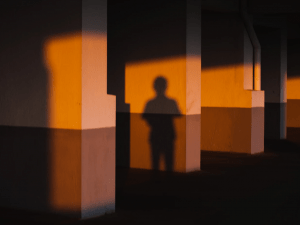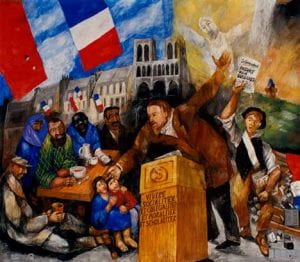As this past academic year was nearing its end, I was eagerly awaiting an upcoming summer trip. A close friend of mine turned fifty this summer and coordinated an adventure for a group of friends to stay in a château in the south of France for a week. Having worked at DePaul for over a decade, I immediately thought of Vincent and Louise when my friend mentioned going to France. I wondered if I would find an opportunity to interact with these two saints in the historical context of their lives. Serendipitously, I ran into my colleague, Mark Laboe, a couple of weeks before my trip. I always appreciate the personalism and care that the staff in Mission and Ministry demonstrate when I chat with them. Mark asked what I had planned for this summer outside of work. I mentioned my upcoming trip to France and that I would be staying near Toulouse. He exclaimed that he had a book to share with me if I was interested. I followed him to the Catholic Campus Ministry office where he and Siobhán O’Donoghue shared nuggets of Vincentian history relevant to the area to where I was traveling. They gave me a copy of In the Footsteps of Vincent de Paul: A Guide to Vincentian France by John E. Rybolt, C.M. Equipped with this solid foundation, I was ready to visit some sites.
 We planned day trips to Toulouse and Narbonne to walk along the same streets and past the same buildings as Vincent and Louise had walked. In Toulouse, we visited the Basilica of Saint-Sernin, one of the oldest structures I have ever seen. The original church on the site was built in the fifth century, and construction of the current structure began in the eleventh century. I wanted to visit this basilica because of its historical significance to the city, and its significance to Vincent’s education. As Rybolt writes: “Because of its importance, it is certain that the young theology student, Vincent de Paul, visited here to pray, and perhaps to celebrate mass during the four years he lived here after his ordination.” [1]
We planned day trips to Toulouse and Narbonne to walk along the same streets and past the same buildings as Vincent and Louise had walked. In Toulouse, we visited the Basilica of Saint-Sernin, one of the oldest structures I have ever seen. The original church on the site was built in the fifth century, and construction of the current structure began in the eleventh century. I wanted to visit this basilica because of its historical significance to the city, and its significance to Vincent’s education. As Rybolt writes: “Because of its importance, it is certain that the young theology student, Vincent de Paul, visited here to pray, and perhaps to celebrate mass during the four years he lived here after his ordination.” [1]
At Saint-Sernin, I was particularly moved while visiting the altar that holds one of Louise’s relics. I felt all my senses engage as I took in the old and new smells of the basilica, the absence of noise as visitors contemplated, the stillness of the air, and the magnificence of the sight of the altar. Viewing the relic and knowing that it is an object that was associated with Louise made me feel a deep sense of connection to the past and to her teachings. Louise built her work on a solid foundation of goodness, and there I stood, inspired by her because of my foundational understanding.
A quote attributed to Louise says, “The greater the work, the more important it is to establish it on a solid foundation. Thus, it will not only be more perfect; it will also be more lasting.” [2] Visiting these Vincentian sites inspired me to reflect on the foundation that the DePaul University community has provided me as a learner, teacher, and traveler.
Reflection questions:
- What is the foundation on which you base your work?
- How can you make your foundation stronger?
- Who are the important figures on which you model your integrity?
Reflection by: Katy Weseman, Assessment & Evaluation Specialist, Division of Student Affairs
[1] John E. Rybolt, C.M., In the Footsteps of Vincent de Paul: A Guide to Vincentian France (Chicago: DePaul University Vincentian Studies Institute, 2007), 351. Available online at https://via.library.depaul.edu/vincentian_ebooks/7/.
[2] Quoted in Vincent Regnault, D.C., Saint Louise de Marillac: Servant of the Poor (Charlotte, NC: TAN Books, 1983). Available online at https://www.google.com/books/edition/St_Louise_de_Marillac/VFc9CwAAQBAJ?hl=en&gbpv=0.



